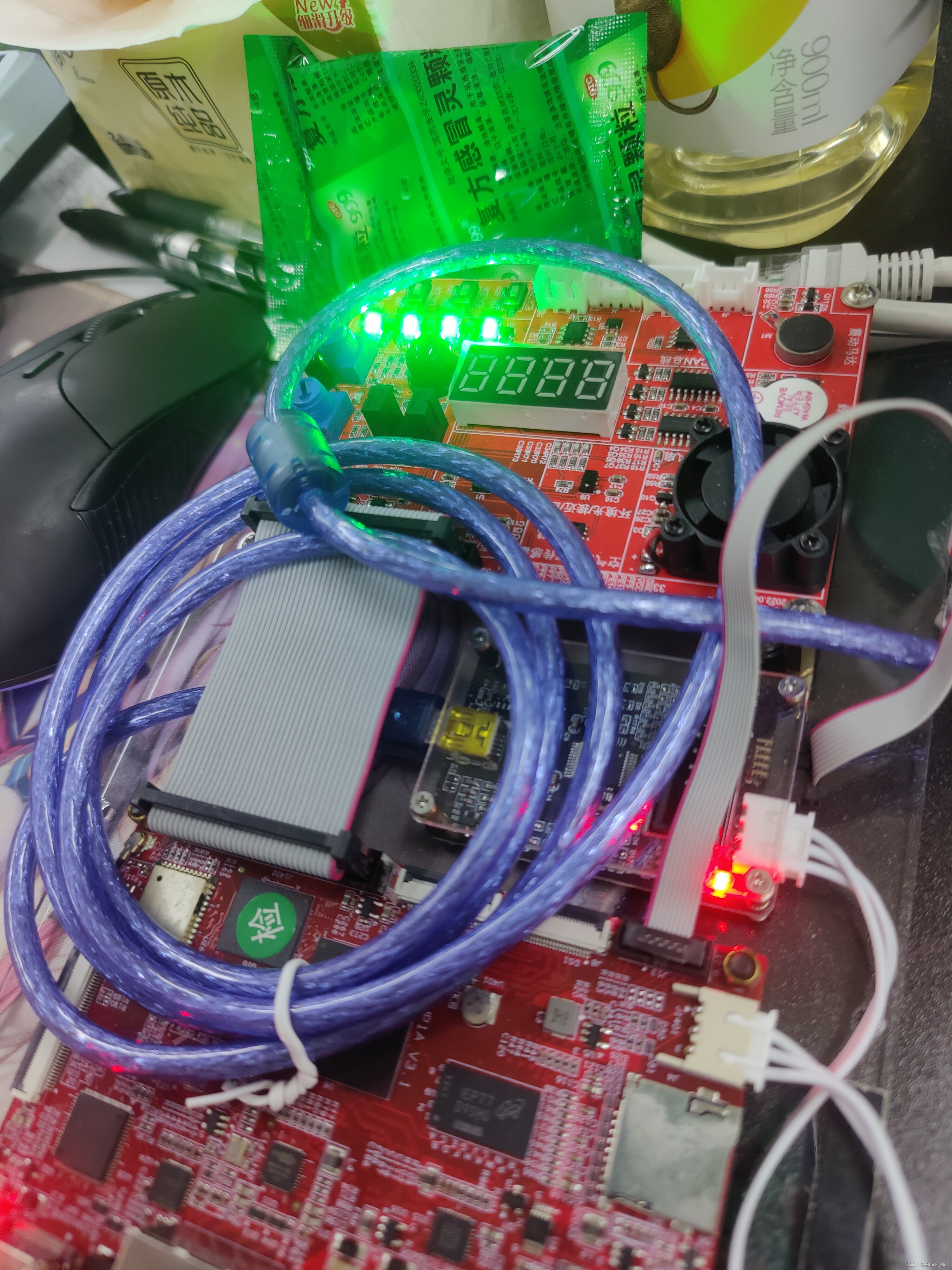pdri.ko
#include <linux/init.h>
#include <linux/module.h>
#include <linux/platform_device.h>
#include <linux/mod_devicetable.h>
#include <linux/of.h>
#include <linux/of_gpio.h>
struct resource *res;
unsigned int irq1;
struct gpio_desc *gpiono1;
struct gpio_desc *gpiono2;
struct gpio_desc *gpiono3;
struct platform_device *pdev1;
struct class *cls;
struct device *dev;
int major;
char kbuf[128] = {0};
//Define operation method
int mycdev_open(struct inode *inode, struct file *file)
{
printk("%s:%s:%d\
", __FILE__, __func__, __LINE__);
return 0;
}
ssize_t mycdev_read(struct file *file, char *ubuf, size_t size, loff_t *lof)
{
printk("%s:%s:%d\
", __FILE__, __func__, __LINE__);
int ret1=copy_to_user(ubuf,kbuf,size);
if(ret1)
{
printk("copy_to_user filed\
");
return -EIO;
}
return 0;
}
ssize_t mycdev_write(struct file *file, const char *ubuf, size_t size, loff_t *lof)
{
printk("%s:%s:%d\
", __FILE__, __func__, __LINE__);
int ret=copy_from_user(kbuf,ubuf,size);
if(ret)
{
printk("copy_from_user filed\
");
return -EIO;
}
if(!strcmp(kbuf,"on"))
{
gpiod_set_value(gpiono1,1);
gpiod_set_value(gpiono2,1);
gpiod_set_value(gpiono3,1);
}
else if(!strcmp(kbuf,"off"))
{
gpiod_set_value(gpiono1,0);
gpiod_set_value(gpiono2,0);
gpiod_set_value(gpiono3,0);
}
return 0;
}
int mycdev_close(struct inode *inode, struct file *file)
{
printk("%s:%s:%d\
", __FILE__, __func__, __LINE__);
return 0;
}
//Define operation method structure variables and assign values
struct file_operations fops = {
.open = mycdev_open,
.read = mycdev_read,
.write = mycdev_write,
.release = mycdev_close,
};
int pdrv_probe(struct platform_device *pdev)
{
//Character device driver registration
pdev1 = pdev;
major = register_chrdev(0, "mychrdev", & amp;fops);
if (major < 0)
{
printk("Character device driver registration failed\
");
return major;
}
printk("Character device driver registration successful: major=%d\
", major);
// Submit directory upwards
cls = class_create(THIS_MODULE, "mychrdev");
if (IS_ERR(cls))
{
printk("Failed to submit directory upward\
");
return -PTR_ERR(cls);
}
printk("Submit directory upward successfully\
");
//Submit device node information upwards
int i; // Submit device node information upward three times
for (i = 0; i < 3; i + + )
{
dev = device_create(cls, NULL, MKDEV(major, i), NULL, "myled%d", i);
if (IS_ERR(dev))
{
printk("Failed to submit device node upward\
");
return -PTR_ERR(dev);
}
}
printk("Submit device node upward successfully\
");
gpiono1 = gpiod_get_from_of_node(pdev1->dev.of_node,"led1-gpio-no",0,GPIOD_OUT_HIGH,NULL);
gpiono2 = gpiod_get_from_of_node(pdev1->dev.of_node,"led2-gpio-no",0,GPIOD_OUT_LOW,NULL);
gpiono3 = gpiod_get_from_of_node(pdev1->dev.of_node,"led3-gpio-no",0,GPIOD_OUT_HIGH,NULL);
if(IS_ERR(gpiono1))
{
printk("Failed to parse GPIO on resource 1\
");
return -PTR_ERR(gpiono1);
}
printk("Parse GPIO on resource 1 successfully\
");
if(IS_ERR(gpiono2))
{
printk("Failed to parse GPIO on resource 2\
");
return -PTR_ERR(gpiono2);
}
printk("Parse GPIO on resource 2 successfully\
");
if(IS_ERR(gpiono3))
{
printk("Failed to parse GPIO on resource 3\
");
return -PTR_ERR(gpiono3);
}
printk("Parse GPIO on resource 3 successfully\
");
printk("USB connection successful\
");
return 0;
}
int pdrv_remove(struct platform_device *pdev)
{
//Release resources
gpiod_set_value(gpiono1,0);
gpiod_put(gpiono1);
gpiod_set_value(gpiono2,0);
gpiod_put(gpiono2);
gpiod_set_value(gpiono3,0);
gpiod_put(gpiono3);
printk("USB device has been ejected\
");
return 0;
}
struct of_device_id oftable[] = {
{.compatible = "kpkp,myplatform",},
{.compatible = "kpkp,myplatform1",},
{},
};
struct platform_driver pdrv = {
.probe = pdrv_probe, //This is an int type function name, the parameter type is struct platform_device*
.remove = pdrv_remove, //This is an int type function name, and the parameter type is struct platform_device*
.driver = {
.name = "AK47",
.of_match_table = oftable,
},
};
//Register macro with one click
module_platform_driver(pdrv);
MODULE_LICENSE("GPL");
pdev.ko
#include <linux/init.h>
#include <linux/module.h>
#include <linux/platform_device.h>
//This is a structure
struct resource res[] = {
[0]={
.start = 0x50006000,
.end = 0x50006000 + 0x400,
.flags = IORESOURCE_MEM,
},
[1]={
.start = 71,
.end = 71,
.flags = IORESOURCE_IRQ,
},
};
void pdev_release(struct device *dev) //This is a function name
{
printk("It has popped up, looking forward to the next link\
");
}
struct platform_device pdev = {
.name = "AK47",
.id = PLATFORM_DEVID_AUTO,
.dev.release = pdev_release, //This is a function name
.num_resources = ARRAY_SIZE(res),
.resource = res, //This is a structure
};
\t
static int __init mycdev_init(void)
{
//Define the device object and initialize it
//Register device information into the kernel
if(platform_device_register( & amp;pdev) < 0 )
{
printk("Failed to register device information\
");
return -ENXIO;
}
return 0;
}
static void __exit mycdev_exit(void)
{
//Log out device information
platform_device_unregister( & amp;pdev);
}
module_init(mycdev_init);
module_exit(mycdev_exit);
MODULE_LICENSE("GPL");
ledu.c
#include <stdlib.h>
#include <stdio.h>
#include <sys/types.h>
#include <sys/stat.h>
#include <sys/ioctl.h>
#include <fcntl.h>
#include <unistd.h>
#include <string.h>
int main(int argc,const char * argv[])
{
int a=0;
char buf[128] = "";
char buf1[128] = "";
int fd1=open("/dev/myled0",O_RDWR);
int fd2=open("/dev/myled1",O_RDWR);
int fd3=open("/dev/myled2",O_RDWR);
if(fd1<0)
{
printf("Failed to open device file 1\
");
exit(-1);
}
if(fd2<0)
{
printf("Failed to open device file 2\
");
exit(-1);
}
if(fd3<0)
{
printf("Failed to open device file 3\
");
exit(-1);
}
memset(buf,0,sizeof(buf));
while(1)
{
printf("Please enter the light control (1 to turn on the light/0 to turn off the light) => ");
scanf("%d", & amp;a);
write(fd1,buf,sizeof(buf));
write(fd2,buf,sizeof(buf));
write(fd3,buf,sizeof(buf));
if(a == 1)
{
strcpy(buf,"on");
write(fd1,buf,sizeof(buf));
write(fd2,buf,sizeof(buf));
write(fd3,buf,sizeof(buf));
}
else if(a == 0)
{
strcpy(buf,"off");
write(fd1,buf,sizeof(buf));
write(fd2,buf,sizeof(buf));
write(fd3,buf,sizeof(buf));
}
read(fd1,buf1,sizeof(buf));
printf("buf1:%s\
",buf1);
}
return 0;

